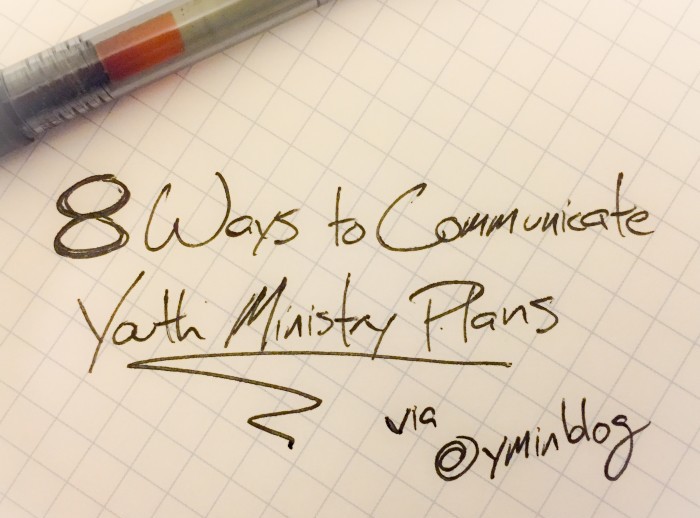by David Hanson | Mar 17, 2016 | On the Job, The Youth Ministry Blog
Over the past week, I’ve had the amazing opportunity to meet with most of my High School Small Group Leaders (these people truly are the hands and feet of Jesus!).

The purpose of this meeting was to evaluate the health of our Small Groups and invite feedback concerning the student ministry. Below, I’ll share with you how I elicited feedback.
“Failed plans should not be interpreted as a failed vision. Visions don’t change, they are only refined. Plans rarely stay the same, and are scrapped or adjusted as needed. Be stubborn about the vision, but flexible with your plan.” – John C. Maxwell
To systematically evaluate our Small Groups and ministry at large, I used the SWOT analysis. According to Wikipedia, no one knows who created the model, but it’s been around since the ‘60’s. SWOT is an acronym for strengths, weaknesses, opportunities, and threats.
These categories are pretty straightforward, but given the fact that I’m in youth ministry, I like to change the “threats” category to “training.” Side Note: If you can think of actual “treats” to your youth ministry…focus on those before every evaluating your ministry! Ha!
Since we shouldn’t have any “threats” to our ministry, I changed the “t” to “training” and asked leaders where they would like to grow, where we could train them.
If you want to know the health of your ministry, the best thing you can do is meet with your leaders and ask them. You will be blown away by the response. Not only will you get valuable feedback that you can begin to take action on, but you will empower your leaders and remind them that they have a voice. If you trust leaders enough to invest in students, you should trust them enough to speak into your strategy and approach.
Will some of the feedback hurt? Absolutely. Do you need to hear it? Absolutely.
“Criticism may not be agreeable, but it is necessary. It fulfills the same function as pain in the human body. It calls attention to an unhealthy state of things.” – Winston Churchill
However, the feedback you receives will not only be negative. I felt like a million bucks leaving each meeting. My leaders were so encouraging and reminded me why I do what I do. They reminded me that true ministry is happening, that our Small Groups are working.
My encouragement to you is to set up a meeting with all your youth ministry volunteers this coming week. When you meet with them, fill out this SWOT Analysis. You will be blown away by the positive feedback, constructive criticism, and ideas that your leaders have!
Once you have all of that feedback, you know exactly where your time and attention need to go and you’ll be able to grow your ministry.
Get my SWOT Analysis
[guestpost]
David Hanson: Texas native, Texas Tech Red Raider, M.Div. at Truett Seminary, husband to Ashley, father to Ava, Ben & Madelyn, Student Pastor at The Fellowship in Round Rock, Tx, table tennis (ping-pong) extraordinaire, addicted to coffee. For anything else…you’ll just have to ask.
[/guestpost]
by David Hanson | Mar 7, 2016 | On the Job, The Youth Ministry Blog
Yesterday I wrapped up our annual series on love, sex, and dating with a focus on culture, temptation, and forgiveness. One of the central topics was pornography. Needless to say, I had every students attention.

In preparation for this message, I came across some pretty staggering statistics about teenagers and porn. I hope these help you process the state of the union as it pertains to your students online endeavors and leads you to more research and follow-through.
Did you know…
9 out of 10 boys are exposed to pornography before the age of 18.
The first exposure to pornography among men is 12 years old, on average.
71% of teens hide online behavior from their parents.
28% of 16-17 year olds have been unintentionally exposed to porn online.
20% of 16-year-olds and 30% of 17-year-oldshave received a sext.
On average…
6 out of 10 girls are exposed to pornography before the age of 18.
15% of boys and 9% of girls have seen child pornography.
69% of boys and 55% of girls have seen same-sex intercourse online.
“Never before in the history of telecommunications media in the United States has so much indecent (and obscene) material been so easily accessible by so many minors in so many American homes with so few restrictions.” – U.S. Department of Justice
Research reveals many systemic effects of Internet pornography that are undermining an already vulnerable culture of marriage and family. Even more disturbing is the fact that the first Internet generations have not reached full maturity, so the upper limits of this impact have yet to be realized” – Jill Manning, Sociologist
The average age of first exposure to Internet pornography is 11
70% of boys have spent more than 30 consecutive minutes looking at online pornography on at least one occasion.
35% of boys have done this on more than ten occasions.
When they talk about porn with friends, 89% of teens, and 95% of young adults say they do so in a neutral, accepting, or encouraging way. That is, only one in 20 young adults and one in 10 teens say their friends think viewing pornography is a bad thing.
32% say viewing porn is “usually or always wrong” compared to 56% who say not recycling is “usually or always wrong.”
And before we pass judgement as pastors and youth pastors, let’s look at this alarming statistic:
Most pastors (57%) and youth pastors (64%) admit they have struggled with porn, either currently or in the past.
Overall, 21% of youth pastors and 14% of pastors admit they currently struggle with using porn.
We have a problem folks. But we also have a great opportunity to talk with students about their identity in Christ. Condemning porn void of helping students be found in Christ is fruitless. May we help students run after Christ in such a way that “the things of earth will grow strangely dim in the light of his glory and grace.” Amen.
[guestpost]
David Hanson: Texas native, Texas Tech Red Raider, M.Div. at Truett Seminary, husband to Ashley, father to Ava, Ben & Madelyn, Student Pastor at The Fellowship in Round Rock, Tx, table tennis (ping-pong) extraordinaire, addicted to coffee. For anything else…you’ll just have to ask.
[/guestpost]
by David Hanson | Mar 2, 2016 | On the Job, The Youth Ministry Blog
As a youth worker, communication is key. We must consistently put our plans, schedules, and programs in front of parents. The view of your ministry will largely be determined by how well you communicate with parents.

A failure to communicate will lead parents to two conclusions: 1) You don’t have a plan. 2) You don’t care.
While these might be furthest from the truth, what good can come from a failure to communicate?
Moment of Honesty: I haven’t always been the best at consistent communication. In some seasons my team has thrived at communication and had parents and leaders commend our efforts. In other seasons, we have failed miserably at communication and had parents unsure what to even think about our ministry!
Regardless of your past performance, what matters most is how you move forward. Resolve to communicate clearly and consistently. If you want to win with parents you will need clear, concise (don’t over communicate), and consistent communication.
With that said, here are 8 Ways to Communicate Youth Ministry Plans:
- Student Ministry Stage Announcements – don’t expect students to tell their parents!
- A Parent Email or Newsletter – build a list using MailChimp…you’re welcome.
- The Adult Service Bulletin – only use for major events & have a presence over the course of multiple weeks…it’ll take that long for them to see it!
- Text Messages – Make a student list & a parent list. Want it free? Use Remind…you’re welcome again.
- Want the entire list? Get the Cheat Sheet…print it off, put it on your desk…you’re welcome again!
Get the Cheat Sheet
[guestpost]
David Hanson: Texas native, Texas Tech Red Raider, M.Div. at Truett Seminary, husband to Ashley, father to Ava, Ben & Madelyn, Student Pastor at The Fellowship in Round Rock, Tx, table tennis (ping-pong) extraordinaire, addicted to coffee. For anything else…you’ll just have to ask.
[/guestpost]
by David Hanson | Mar 1, 2016 | On the Job, The Youth Ministry Blog
On a mission trip, transformation and preparation go hand-in-hand. If you want to see transformation, preparation matters.

These were the words of Greg, my youth ministry elder, this past Sunday at our first meeting for our July trip to the Dominican Republic. Greg is right. Short-term mission trips are transformational for those who faithfully prepare.
As a youth pastor, I want to make every effort to prepare students for what they will experience and what they should expect on a mission trip. Furthermore, I want to make sure that my students are thinking intentionally about the purpose and function of short-term missions.
It’s my firm belief that short-term missions should be tied to a long-term mission. In other words, churches or groups looking to take a week-long trip should look to partner with someone who has boots on the ground for the long haul. A short-term mission team should seek to join and bless the mission of those who are seeking long-term transformation.
Furthermore, a mission team should spiritually, emotionally, and intellectually prepare for the trip. As a mission trip leader, I have no problem asking a lot from those who want to be a part of our mission team.
Mission Trip Requirements:
- 6 Mandatory Meetings
- 2 Required Readings
- 30 Day Devotional
- Fundraising
[shareable text=”Faithful preparation will open your eyes & hearts to what God wants to accomplish in & through your team. via @yminblog #youthmin #missions “]Faithful preparation will open your eyes and hearts to what God wants to accomplish in and through your team. #youthmin #missions TWEET THIS![/shareable]
Want to see our Deadlines and Meetings Schedule? Download it here.
Where are you going on mission this summer?
What do you do to prepare?
Comment below!
Mission Trip Meetings & Deadlines
[guestpost]
David Hanson: Texas native, Texas Tech Red Raider, M.Div. at Truett Seminary, husband to Ashley, father to Ava, Ben & Madelyn, Student Pastor at The Fellowship in Round Rock, Tx, table tennis (ping-pong) extraordinaire, addicted to coffee. For anything else…you’ll just have to ask.
[/guestpost]
by David Hanson | Feb 26, 2016 | On the Job, The Youth Ministry Blog
I wrestle with control. I like to control things…specifically in youth ministry. I would rather do something myself and know it will be done right than let someone else do it and it not turn out the way I planned.

One of my students leading our transition to worship.
However, when we open Scripture, we Jesus entrusting ministry to the disciples. Jesus came to be the perfect propitiation for our sin, but also to hand off ministry to a mixed bag of nuts. Every time the disciples seem to have it together, they have a concentration lapse and start arguing about who will be the greatest in the kingdom. Sound familiar?
If you are a youth pastor you have seen this. You have seen students demonstrate an amazing ability to faithfully do ministry. But then days later, those same students do something that makes you question their salvation…sigh.
But we can’t give up. We can’t completely take back the reins. We must continue to hand off ministry to students…it’s what Jesus did…it’s what He had to do so that the ministry of reconciliation would move forward.
I am always looking for ways to hand ministry of to students. Whether it be a Bible Study they are doing at their school, leading worship, or most recently for me…leading Wednesday programming. For the last two months, I have handed a large part of our Wednesday night programming to students. I have put the planning, preparation, and execution of our welcome, game/activity, and transition into worship into their hands.
I can’t even begin to describe how hard this has been for me. There have been times where I have wanted to barge onto the stage and grab the mic…but I let go…and God moved! Students thrive off of the energy and presence of other students on the stage.
Robert Coleman, is his classic text The Master Plan of Evangelism, describes the method Jesus used to hand off ministry to the disciples. Steps 5-7 of 8 give us the verbiage of demonstration, delegation, and supervision. These work perfect in describing how we should be handing off ministry to students.
Demonstration – Let students watch you do what you will ask them to do. The disciples watched the way Jesus taught, prayed, healed, and loved others.
Delegation – Give your students meaningful ministry that will help them develop leadership skills. Jesus in Mark 6:7 sent the disciples out 2-by-2 to do ministry. He entrusted them to do the things they had seen Him doing.
Supervision – Give your students feedback on the work they are doing. Help them continue to grow and develop their ministerial skills. In Mark 6:30, after going out 2-by-2, they return to Jesus for a debrief. Imagine what those conversations where like!
What does this look like in your ministry? Are you being too controlling? Are you demonstrating, delegating, and supervising? Are you giving youth ministry back to youth?
[guestpost]
David Hanson: Texas native, Texas Tech Red Raider, M.Div. at Truett Seminary, husband to Ashley, father to Ava, Ben & Madelyn, Student Pastor at The Fellowship in Round Rock, Tx, table tennis (ping-pong) extraordinaire, addicted to coffee. For anything else…you’ll just have to ask.
[/guestpost]






